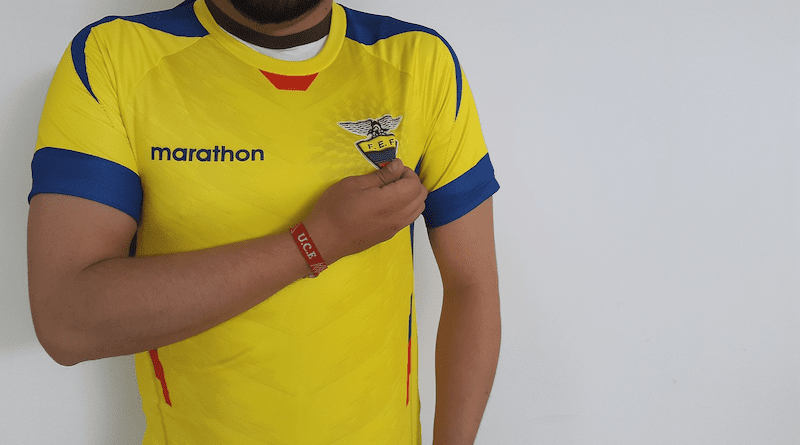Dusan Draskovic: The Montenegrin Behind Ecuador’s Football Revolution – Analysis
Tiny Ecuador’s success in getting to the 2022 World Cup in Qatar is partly down to the vision of a man who left Yugoslavia 34 years ago, on a mission to transform a failing national team into its exact opposite.
By Fatjona Mejdini
Ecuador’s national football team on November 20 will kick off the 2022 World Cup, playing the host country, Qatar, in its Al Bayt Stadium.
Ecuador’s qualification for the world’s biggest sporting tournament is hugely important for the people of this small Latin American country who take great pride in their football skills.
It is also because their team’s road to global recognition has been tough and long. Ecuador was an underdog in Latin America’s competitive football scene for decades.
But a breakthrough came 20 years ago, in 2002, when Ecuador qualified for the first time for a World Cup. And what everyone in the country agrees is that behind this success was the hard work and vision of a Montenegrin named Dusan Draskovic.
Draskovic, now 83, first set foot in Ecuador on March 5, 1988. He arrived from what was then Yugoslavia with little Spanish and no knowledge about the country he now calls home.
“On the plane, I asked a woman who happened to sit next to me to help me put together a short speech for journalists that I might encounter at the airport. But when I landed and saw the big crowd of them and football fans, I got anxious and couldn’t find the piece of paper that I wrote on the plane,” he recalls.
He had come to Latin America on a mission to assemble and manage a new Ecuadorian national football team. In a continent full of glamorous national football teams, such as Brasil, Argentina and Uruguay, Ecuador’s team was weak and performed poorly in Copa America competitions.
His selection was not random. The Ecuadorian Football Association were convinced they needed to try out a Yugoslav manager to boost their national team’s chances.
“Yugoslavia had quality football back then, and was creating a good generation of football technicians, sought after all over the world,” Draskovic told BIRN.
He took up the Ecuadorian challenge at the age of 49, leaving behind a career as a manager for several clubs in Yugoslavia and after a short, unsuccessful stint in the United Arab Emirates.
Born in Banja Luka, northwest Bosnia, to a Montenegrin family, he started to play football as a youngster for local teams such as Njegos of Lovcenac, Spartak of Subotica, Radnicki of Nis, and clubs like Vojvodina and Vrbas in Vojvodina.
He quit playing at an early age because of an injury but didn’t quit football. At 22, he enrolled and completed a 35-day football technician course in Subotica, a qualification that opened a new career door.
His football managing career started at Hajduk Veljko, a club in the small town of Negotin, then at Spartak in Subotica and Borac of Banja Luka.
Draskovic now lives in Guayaquil, the largest city and the chief port of Ecuador. He managed the national football team from 1988 to 1993, and then moved to major Ecuadorian clubs like Barcelona SB, Emelek and Deportivo Quito.
His presence in a café in the city centre doesn’t pass unnoticed. People constantly stop to greet and compliment him and ask for pictures or even for video messages they can share with friends and loved ones.
When he came to take over the Ecuadorian national team, the challenges were higher than the Andes. The football scene was disorganized and uncoordinated, talent was missing, infrastructure was basic and morale was low.
“It helped a lot that I was coming from the Balkans, I don’t think a German manager, for example, would have found the courage to tackle those difficulties and see hope,” he said.
Draskovic immediately toured the country. He went to see youngsters play football wherever they were, in local clubs or neighborhoods. Soon he made the first selections, mainly boys from poor backgrounds that had a talent for football but lacked preparation.
“I started to work with those with talent, changing completely the methodology of training. I didn’t just emphasis their physical preparation but their psychological one. I worked with their temperament, intelligence, character and personality,” he recalls.
Changing the players’ mentality and building their self-confidence became his priorities.
“Ecuadorian players had nothing less than their more uccessful Latin American peers. They only needed care and guidance, and to learn how to be self-confident,” he said.
Maria Belen Arroyo, a prominent journalist in Ecuador, believes that during his five years of managing the national team he started a football revolution.
“There is full consensus in Ecuador that Dusan is a revolutionary. He created a national football team that inspired many youngsters to love football and become professional players, especially those from places with high levels of poverty, with no education or work opportunities. Before him, nobody believed in a career in football,” she told BIRN.
Under his tenure, the Ecuadorian national team started to show professionalism, gain recognition and respect from competitors and form a solid generation of talented players.
In 1993, the Copa America was held in Ecuador for the first time and the team came fourth, ahead of more important ones, like Brazil and Uruguay. The big breakthrough came nine years later, when Ecuador qualified for the World Cup for the first time.
“Ecuadorians believe that Dusan’s vision and hard work planted those seeds,” Maria Belen Arroyo says.
Besides considering him a revolutionary, media call him the architect of the modern Ecuadorian football, or just the “professor”. For football fans, he is simply a hero.
The humble Draskovic prefers to speak more about techniques and the need for consistency in training as the key aspects behind his success in football. While speaking, he scribbles football tactics on café napkins, speaking passionately in Spanish – with a distinct Slavic accent.
At 83, he still works with young players, as football director of team of the Catholic University of Santiago de Guayaquil, UCSG,. He is also a football commentator on Ecuadorian TV and the author of a book on football techniques. He has taught new managers of Ecuadorian football the tips and tricks of the profession.
Sadly, a medical condition means he won’t be able to attend Ecuador’s match in Qatar. But he will watch it from his house in Guayaquil – proud of their success – and of his own contribution to it.


